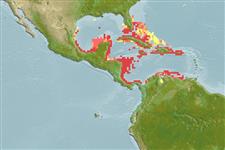>
Mugiliformes (Mullets) >
Mugilidae (Mullets)
Etymology: Joturus: Taken from the Greek letter "iota" = the least or in the very small quantity + Greek, oura = tail (Ref. 45335).
More on author: Poey.
Environment: milieu / climate zone / depth range / distribution range
Ecologia
marinhas; Água doce; estuarina; catádromo (Ref. 51243); intervalo de profundidade 10 - ? m. Subtropical; 22°C - 25°C (Ref. 36880); 30°N - 7°N, 112°W - 65°W
Central America: Bahamas and Greater Antilles and the Atlantic and Pacific slopes of Central America and Colombia.
Tamanho / Peso / Idade
Maturity: Lm ? range ? - ? cm
Max length : 61.0 cm TL macho/indeterminado; (Ref. 9321); common length : 25.0 cm TL macho/indeterminado; (Ref. 9321); peso máx. Publicado: 3.3 kg (Ref. 40637)
Adults inhabit the upper reaches of rivers but enter brackish waters where spawning probably occurs. An important food fish in some areas. Herbivorous and scrapes algae from stones on the bottom with its fleshy lips, although sometimes eats prawns (Ref. 36880). Oviparous, eggs are pelagic and non-adhesive (Ref. 205). Migrate from the upper reaches of rivers during months of high rainfall to the sea-river transition zone to spawn (Ref. 13802).
Life cycle and mating behavior
Maturidade | Reprodução | Desova | Ovos | Fecundidade | Larvas
Harrison, I.J., 1995. Mugilidae. Lisas. p. 1293-1298. In W. Fischer, F. Krupp, W. Schneider, C. Sommer, K.E. Carpenter and V. Niem (eds.) Guia FAO para Identification de Especies para lo Fines de la Pesca. Pacifico Centro-Oriental. 3 Vols. FAO, Rome. (Ref. 9321)
Categoria na Lista Vermelha da IUCN (Ref. 130435)
Ameaça para o homem
Harmless
Utilização humana
Pescarias: pescarias de subsistência
Mais informação
Nomes comunsSinónimosMetabolismoPredadoresEcotoxicologiaReproduçãoMaturidadeDesovaAgregação para desovaFecundidadeOvosDesenvolvimento dos ovos
ReferênciasAquaculturaPerfil para aquaculturaEstirpesGenéticaElectrophoresesHereditariedadeDoençasProcessamentoNutrientsMass conversion
ColaboradoresFotografiasStamps, Coins Misc.SonsCiguateraVelocidadeTipo de nataçãoÁrea branquialOutras referênciasCérebrosVisão
Ferramentas
Relatórios especiais
Descarregue XML
Fontes da internet
Estimates based on models
Preferred temperature (Ref.
123201): 27.5 - 28.4, mean 28 °C (based on 223 cells).
Phylogenetic diversity index (Ref.
82804): PD
50 = 1.0000 [Uniqueness, from 0.5 = low to 2.0 = high].
Bayesian length-weight: a=0.01175 (0.00558 - 0.02474), b=2.96 (2.79 - 3.13), in cm total length, based on LWR estimates for this (Sub)family-body shape (Ref.
93245).
Nível Trófico (Ref.
69278): 2.9 ±0.37 se; based on food items.
Resiliência (Ref.
120179): Médio, tempo mínimo de duplicação da população 1,4 - 4,4 anos (Assuming tm=2).
Fishing Vulnerability (Ref.
59153): Moderate vulnerability (44 of 100).
Climate Vulnerability (Ref.
125649): Very high vulnerability (88 of 100).
Nutrients (Ref.
124155): Calcium = 80.4 [31.3, 190.5] mg/100g; Iron = 1.2 [0.6, 2.7] mg/100g; Protein = 19.4 [17.7, 21.0] %; Omega3 = 0.501 [0.239, 1.087] g/100g; Selenium = 18.3 [9.2, 38.9] μg/100g; VitaminA = 11.5 [3.4, 41.2] μg/100g; Zinc = 1.08 [0.76, 1.61] mg/100g (wet weight);
